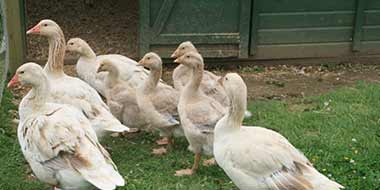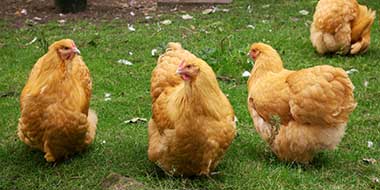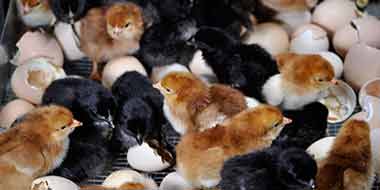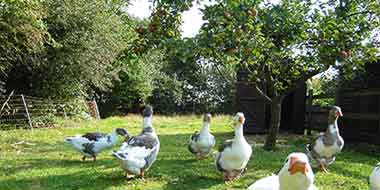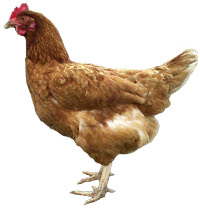
Uses: Utility – eggs / meat and as pets.
Origin: Crosses between pure breeds or other hybrids
Eggs: Hybrid layers: usually more pure breeds.
Weight: Various – layers are usually light, fast maturing with good feed conversion. Table hybrids are heavy to provide a good carcass in a short time so are extremely fast to mature.
Useful to Know: Cheaper than pure breeds, available in quantity and usually tame easily. Normally vaccinated.
Photo: A Bovans Goldline hen, one of the many names given to hybrids from a certain producer.
Hybrid Chickens are cross-bred from pure breeds such as the Light Sussex, Rhode Island Red or Leghorn. There are hybrid table birds and, more common for backyard chicken keepers, hybrid layers.
Hybrid chicken development only started in the 1950s; before that, it was common to keep pure breeds on farms.
Over the last decade, breeders have been producing more hybrids that produce attractive egg colours (greens, blues and browns), with supermarkets in the UK now selling more coloured eggs such as those coming from the Cotswold Legbar or Burford Brown flocks.
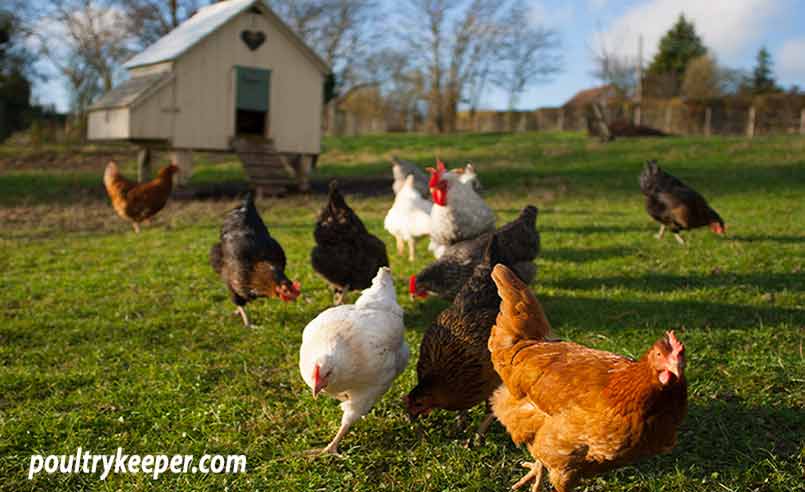
For hobby poultry keepers, there are often many different hybrids to choose from that are productive and ideal for beginners. Commercially, the hybrids’ parents can no longer be considered as ‘pure breed’.
Specific strains have been created by crossing many generations, selecting certain characteristics within the offspring such as egg numbers, feed conversion or a broad breast, fast maturity and body weight in table hybrids.
Hybrids do not breed true, so you have to cross the original stock again when you need more of them.
Benefits of hybrid chickens
There are several benefits of using hybrids instead of pure breeds. Since the bloodlines are so different from the parents, the offspring are usually very fit and healthy.
When certain breeds are crossed, sex linkage allows the sex of the chicks to be established at a day old by a difference in down colour, which is useful when producing hens for laying since it reduces the rearing costs to the breeder and ultimately the price you pay.
When crossing certain strains of birds, you can get ‘Hybrid Vigor’, where a chick is better than either of its parents. This is known as ‘nicking’. For example, if the strains on the father and mothers sides lay 200 eggs per year, the offspring might ‘nick’ and lay 220 per year.
Some strains can also do the opposite, though and lay 180 eggs per year, so once the right strains have been established, breeders keep a closed flock of parent birds to ensure the quality of the offspring remains the same.
This is just one of the positive characteristics inherited from the parent strains and the reason why commercially, there are many different names given to the hybrids produced from a given hatchery or parent strains of birds.
The “Black Rock” Hybrid, for example, is a registered name for a Rhode Island Red / Barred Plymouth Rock cross that comes from Crosslee Poultry Farm in Scotland. Every seller in the UK must buy their Black Rock chickens from this hatchery since the name is protected and refers to the hybrid produced from their specific strains. There are many other names for the same type of cross that breeders use, but the type of hen you get may perform differently.
Hybrid hens for beginners
Hybrids are ideal beginners birds; they are usually vaccinated (often uneconomical for small quantities of pure breeds) and are generally quite tame and easy to handle. They are cheaper than pure breeds; you can expect to pay between £10 and £15 for a POL (Point of Lay) Hybrid, compared to £25 – £35 for a pure breed hen.
These are some popular Hybrid Layers:
- Bovans Goldline
- Copper Black (French Copper Marans / Rhode Island Red)
- Black Tail, Gingernut Ranger (Rhode Island Red / Light Sussex)
- Blue (Andalusian / Barred Plymouth Rock)
- Amber (Rhode Island White / Rhode Island Red)
- Warren, Marans Cuivre (Rhode Island Red / Marans cross)
- Bovans Nera, Black Star, Nera, Rhode Rock (Rhode Island Red / Barred Plymouth Rock cross)
- Speckldy (Marans / Rhode Island Red)
What are the best hens for eggs – Hybrids or pure-breeds? Anne looks at the advantages and disadvantages of the two and suggests the best laying hens for the backyard chicken keeper.
Breeding hints
Hybrids do not breed true. If you cross a hybrid chicken with another breed or cross, you will not get the same bird with the same performance as the original hybrid, however 'like breeds like' and if you are careful with your choice of cross, you can still get some reasonably good performing birds.















